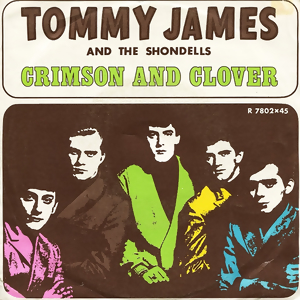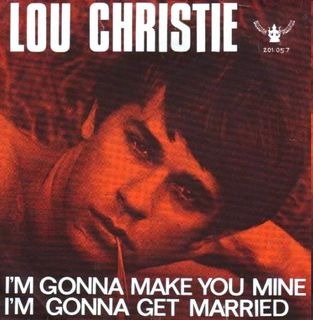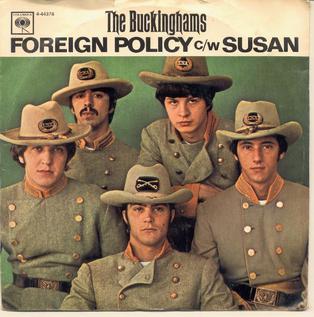
"Crimson and Clover" is a 1968 song by American rock band Tommy James and the Shondells. Written by the duo of Tommy James and drummer Peter Lucia Jr., it was intended as a change in direction of the group's sound and composition.

"I Think I Love You" is a song by Tony Romeo, written as the debut single for fictional musical TV family the Partridge Family. It was released in August 1970, a month prior to the debut of the ABC-TV musical sitcom The Partridge Family starring Shirley Jones and featuring David Cassidy, both of whom appear on the record, with Cassidy as lead vocalist. The single topped Billboard's Hot 100 for three weeks in November and December 1970 and later was certified by NARM as the best-selling single of 1970.

"No Matter What" is a song originally recorded by Badfinger for their album No Dice in 1970, written and sung by Pete Ham and produced by Mal Evans.

"Chirpy Chirpy, Cheep Cheep" is a song recorded in 1970 by its composer Lally Stott, and made popular in 1971 by British band Middle of the Road for whom it was a UK #1 chart hit. That version is one of fewer than fifty singles to have sold more than ten million physical copies worldwide.
"Hair" is the title song to the 1967 musical Hair and the 1979 film adaptation of the musical.

The Cuff Links were an American rock/pop studio group from Staten Island, New York, United States. The ostensible band had a US No. 9 hit in 1969 with "Tracy", with rich harmonized vocals provided entirely by Ron Dante. The track was produced as part of a series of recording sessions – sometimes as many as six in a day – by Dante, with the songs released under a variety of band names. Dante left the act after their first album; on later singles vocals were provided by Joey Cord and/or Rupert Holmes.

"Just One Look" is a song co-written by American R&B singers Doris Troy and Gregory Carroll. The recording by Doris Troy was a hit in 1963. The Hollies, Anne Murray, Linda Ronstadt and Iain Matthews each achieved great success with the song. There have also been many other versions.

"The Rain, the Park & Other Things" is a pop song with music and lyrics co-written by Artie Kornfeld and Steve Duboff. It was recorded by the pop band the Cowsills, and included on their 1967 self-titled debut album. Released as a single, the song reached No. 2 on the Billboard charts. It was kept from the No. 1 spot by "Daydream Believer" by the Monkees. The single cemented the group's international popularity and sold some three million copies over the years. It ties with 1969's "Hair" as the group's biggest hit, as both reached No. 2 in the US. In Canada, "The Rain, the Park & Other Things" reached No. 1 on the RPM singles chart.

"Indian Lake" is a song with music and lyrics written by Tony Romeo. It was recorded by the pop band The Cowsills, and included on their 1968 album Captain Sad and His Ship of Fools. Released as a single, the song reached No. 10 on the Billboard Hot 100, while reaching No. 6 on the Cash Box Top 100, and No. 3 on Canada's RPM 100. The song was ranked as the No. 51 Single of 1968 by Cashbox magazine in its year-ending December 28, 1968 issue. The single eventually sold over 1 million copies, and was later licensed for use in commercials for the Dodge Charger.

"Did You Ever Have to Make Up Your Mind?" is a song written by John Sebastian and first released by his band the Lovin' Spoonful on their 1965 debut album Do You Believe in Magic. It was the second single released from the album and the most successful, reaching number 2 on the American Billboard charts for the week of June 11, 1966. It also reached number 2 in Canada. In New Zealand, the song charted at number 5.

"I'm Gonna Make You Mine" is a song released in 1969 by Lou Christie. It was featured on his 1969 album I'm Gonna Make You Mine, arranged by Stan Vincent and produced by Vincent and Mike Duckman.

"Precious and Few" is a song recorded by American group Climax which became a major North American hit in early 1972. The song was written by the band's guitarist, Walter D. Nims.

"So Sad (To Watch Good Love Go Bad)" is a song written by Don Everly, which was released by The Everly Brothers in 1960. The song was later a country hit for multiple artists in the 1970s and 80s.

"Susan" is a song by The Buckinghams, released as a single in 1967, and on their album Portraits in 1968. It spent 12 weeks on the Billboard Hot 100 chart, peaking at No. 11, while reaching No. 7 on Canada's RPM 100, No. 2 on Canada's CHUM Hit Parade, No. 2 in the Philippines, and No. 18 on New Zealand's NZ Listener chart.

"She'd Rather Be with Me" is a song written by Garry Bonner and Alan Gordon and released by the Turtles in 1967. The song was the follow-up to "Happy Together".

"Winter World of Love" is a song recorded by Engelbert Humperdinck, which was released on his eponymous album and as a single in 1969.
"Stay Awhile" is a song written by Ken Tobias, and was an international hit single for the Bells in 1971.

"Western Union" is a 1967 song by the American rock band the Five Americans. The single peaked at number 5 on the Billboard Hot 100 in April 1967. It also reached number 7 on the Cash Box Top 100 Singles chart that same month.
"The Way It Used to Be" is a song recorded by Engelbert Humperdinck, which was released on the album Engelbert and as a single in 1969. It is an English language adaptation of the Italian language song "Melodia", which was originally released by Isabella Iannetti in 1968.

"When Julie Comes Around" is a song written by Lee Pockriss and Paul Vance. It was first released as "When Joey Comes Around" by Tasha Thomas in July 1969, and produced by Pockriss and Vance in a slightly soul-ish arrangement. This version failed to chart. The song is best known for the version by the Cuff Links, also produced by Pockriss and Vance in a different pop-oriented arrangement. Released in November 1969, the Cuff Links' recording of the song peaked at number 41 on the US Billboard Hot 100 and number 10 on the UK Singles Chart.

















